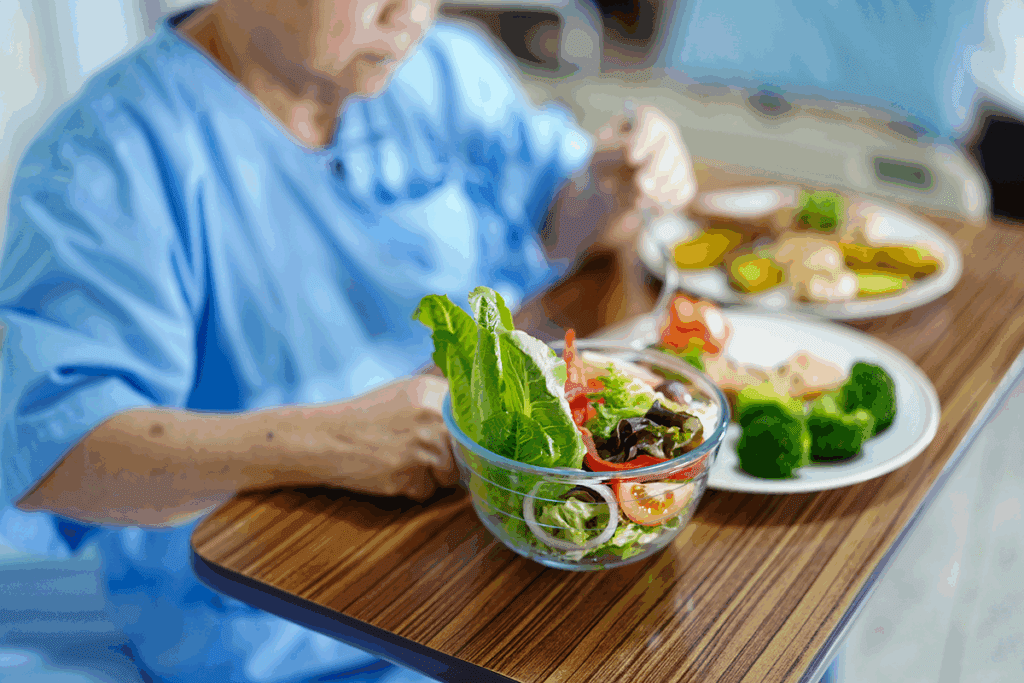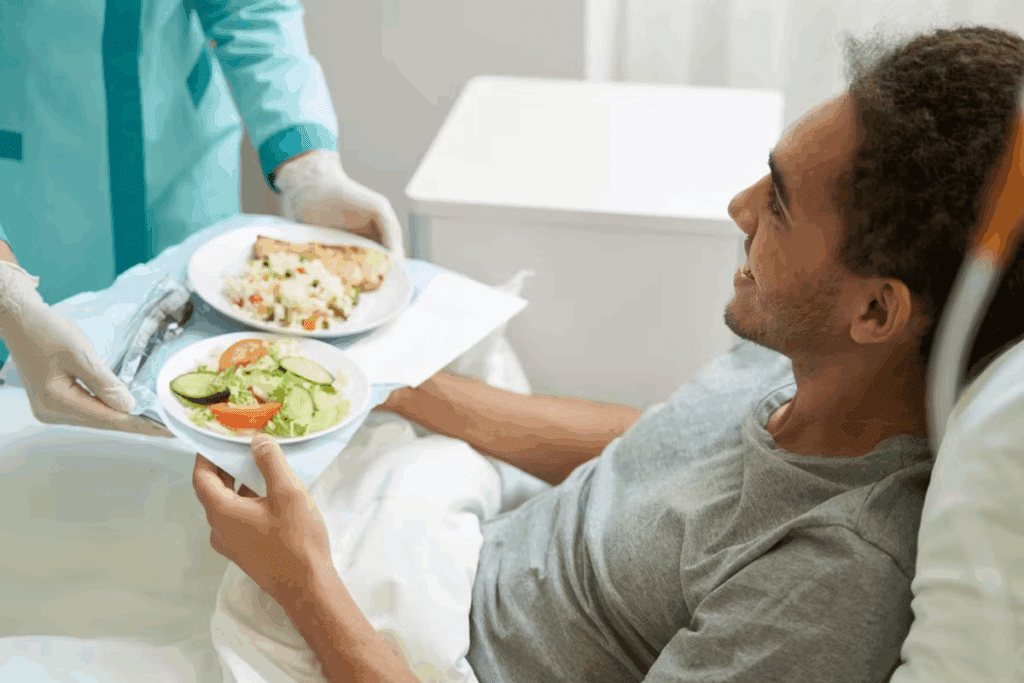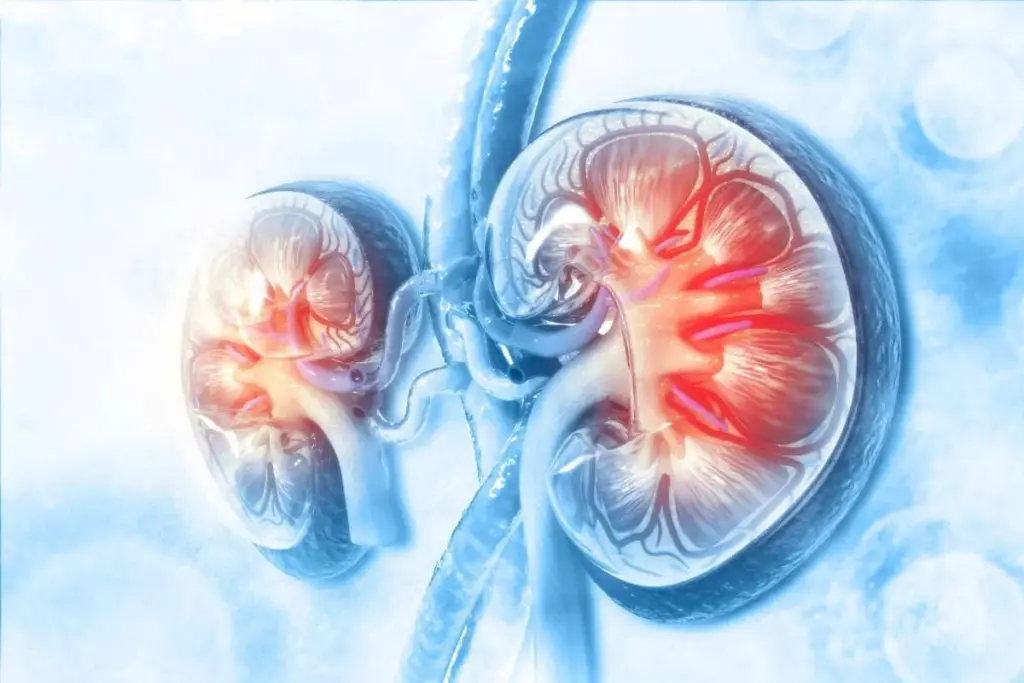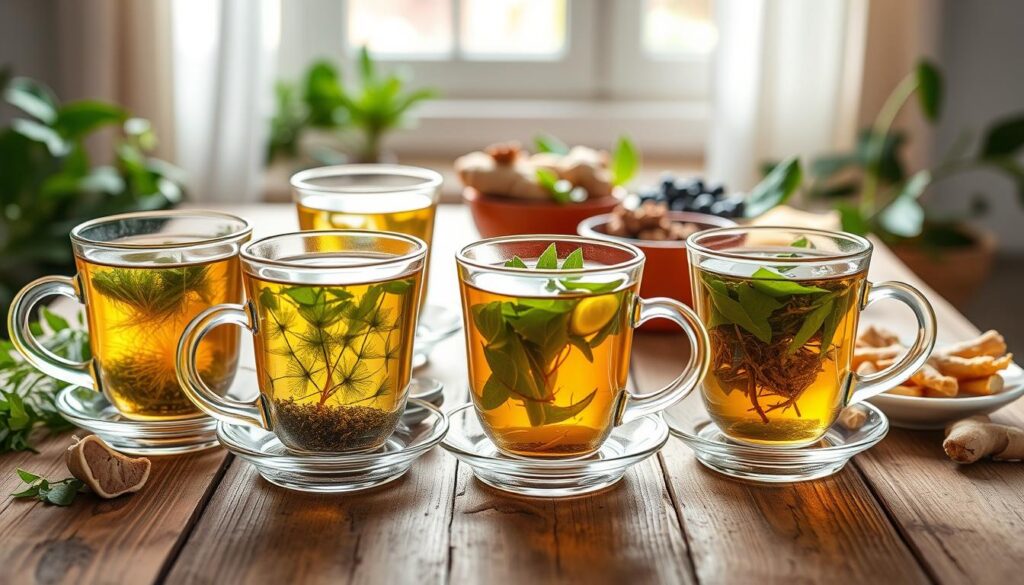
Keeping a healthy diet is key to avoiding colon polyps and keeping your colon healthy. Studies show that eating too much red and processed meat, fried foods, and sugary snacks raises your risk of getting colon polyps.
Eating a lot of red and processed meats can lead to more polyps because of harmful compounds made during processing and cooking. Liv Hospital offers trusted care to help you prevent colon polyps and take care of your diet.
Key Takeaways
- A diet rich in red and processed meats increases the risk of colon polyp formation.
- Fried foods and sugary snacks are also linked to a higher risk of colon polyps.
- A healthy diet is key to preventing colon polyps and keeping your colon healthy.
- Liv Hospital provides patient-centered care for colon polyp prevention.
- Dietary self-care is essential for maintaining overall colorectal health.
The Connection Between Diet and Colon Polyps

Research shows that diet is key in preventing colon polyps. It’s essential to study how food choices affect polyp formation. This is because polyps can turn into colorectal cancer.
It’s best to avoid red and processed meats, fried foods, and sugary snacks. Eating healthy, exercising, and drinking less alcohol can lower cancer risk by a third.
How Food Choices Influence Polyp Formation
What you eat can affect polyp formation. Eating a lot of red and processed meats increases the risk of polyps. A diet full of fruits, vegetables, and whole grains can help lower this risk.
Dietary Factors Influencing Colon Polyp Formation:
| Dietary Factor | Effect on Colon Polyps |
| High Red Meat Consumption | Increased Risk |
| High Intake of Processed Meats | Increased Risk |
| Diet Rich in Fruits and Vegetables | Reduced Risk |
| High Fiber Intake | Reduced Risk |
Recent Research on Diet and Digestive Health
New studies highlight diet in digestive health. A diet rich in fiber and low in processed foods can lower polyp risk. Some nutrients and eating patterns also protect against colorectal cancer.
Knowing how diet affects colon health helps make better choices. A balanced diet and healthy lifestyle are key to managing colon polyps.
Red Meat: A Major Risk Factor for Polyp Growth

Red meat is a considerable risk for colon polyps. Studies show it can raise the chance of getting colon polyps. These can lead to colorectal cancer.
It’s key to know how red meat affects colon health. This knowledge helps lower the risk of polyps.
Why Red Meat Increases Polyp Risk
Red meat, cooked at high heat or processed, has harmful stuff. Heme iron in it can damage colon cells. This can lead to polyps.
Cooking red meat badly can form carcinogenic compounds. These, like PAHs and HCAs, raise cancer risk.
Healthier Protein Alternatives for Colon Health
Switch to healthier proteins to cut down on red meat. Poultry and fish are good. They have less fat and more omega-3s, which are good for the colon.
Eat more fruits, veggies, and whole grains. They’re high in fiber. A high-fiber diet keeps the digestive system healthy and lowers polyp risk.
Choosing better foods and eating less red meat helps keep the colon healthy. It also lowers the chance of getting colon polyps.
Processed Meats: What Foods to Avoid If You Have Polyps
Eating processed meats can raise your risk of getting colon polyps. These meats are preserved by smoking, curing, or adding preservatives. They taste good but can be harmful, mainly for those with colon polyps.
Harmful Compounds in Processed Meats
Processed meats have harmful substances that can lead to colon polyps.Nitrates and nitrites are used to preserve them. They turn into toxic substances in our bodies. Also, advanced glycation end products (AGEs) from high-heat cooking cause inflammation and stress, raising polyp risk.
These meats are also high in sodium. Too much sodium can cause stomach problems. People with colon issues should watch their sodium intake.
Common Processed Foods to Eliminate from Your Diet
To lower polyp risk, cut down on or avoid certain processed foods. Here are some common ones:
- Sausages and hot dogs
- Bacon and other cured meats
- Canned meats, such as spam or corned beef
- Processed deli meats, like ham and salami
Switch to plant-based alternatives or lean protein sources. Eating more fruits, veggies, and whole grains helps your digestion too.
Choosing what you eat wisely can help manage your colon health. It can also lower the chance of getting polyps.
Fried and High-Temperature Cooked Foods
High-heat cooking can create harmful substances that may raise the risk of colon polyps. Foods fried at high temperatures can form dangerous compounds.
Carcinogenic Compounds Formed During High-Heat Cooking
Frying, grilling, or broiling can create harmful substances like acrylamide and PAHs. Research shows that charred foods can increase colon cancer risk due to these compounds.
Common Carcinogenic Compounds:
- Acrylamide: Forms in starchy foods cooked at high temperatures.
- PAHs: Found in foods cooked over open flames or high-heat grilling.
- Advanced Glycation End-products (AGEs): Accumulate in foods cooked at high temperatures, potentially promoting inflammation.
Alternative Cooking Methods for Polyp Prevention
To lower the risk of high-heat cooking, try different cooking methods. Liv Hospital recommends using methods that reduce the formation of harmful compounds.
Healthier Cooking Alternatives:
| Cooking Method | Description | Benefits |
| Steaming | Cooking food using steam. | Preserves nutrients, reduces carcinogenic compound formation. |
| Poaching | Less oil required, which reduces the risk of carcinogenic compounds. | Retains moisture, minimizes harmful compound formation. |
| Baking | Cooking food in the oven using dry heat. | Less oil required, reduces the risk of carcinogenic compounds. |
Using these cooking methods can help lower the risk of colon polyps from fried and high-temperature foods.
Refined Grains and Low-Fiber Carbohydrates
Eating a lot of refined grains and low-fiber carbs can raise your risk of colon polyps. Foods like white bread and sugary snacks lack fiber and nutrients. This makes them less good for your digestive health.
Fiber is key to a healthy digestive system. It helps keep your bowels moving well. This lowers the risk of colon polyps and cancer.
The Protective Role of Fiber Against Polyps
Fiber is vital for stopping colon polyps. It helps get rid of waste from your digestive system. This reduces your contact with harmful substances.
“The protective effect of fiber against colon polyps is well-documented. A high-fiber diet can help to prevent the formation of polyps and reduce the risk of colorectal cancer.”
Dr. John Smith, Gastroenterologist
To get more fiber, eat more whole grains, fruits, and veggies. These foods are full of fiber and important nutrients. They help keep you healthy overall.
Whole Grain Substitutions for Refined Products
Choosing whole grains over refined ones can make your diet better. Whole grains like brown rice, quinoa, and whole-wheat bread are full of fiber and nutrients.
| Refined Grain | Whole Grain Alternative | Fiber Content (g) |
| White Rice | Brown Rice | 3.5 |
| White Bread | Whole-Wheat Bread | 4.4 |
| Sugary Cereals | Oatmeal with Fruits | 4.0 |
Switching to whole grains can boost your fiber intake. This lowers your risk of colon polyps. Start adding whole grains slowly to let your body adjust.
Sugary Foods and Beverages
Sugary foods and drinks are bad for your health and can cause colon polyps. Eating too much sugar leads to inflammation and insulin resistance. These factors increase the risk of colon polyps.
How Sugar Contributes to Intestinal Inflammation
Diets high in added sugars can cause intestinal inflammation. This inflammation may help colon polyps grow. Research shows that eating a lot of sugar can make the body more inflamed, harming the colon.
Mechanisms through which sugar contributes to inflammation include:
- Triggering the release of pro-inflammatory cytokines
- Causing an imbalance in gut microbiota
- Increasing the production of advanced glycation end-products (AGEs)
Identifying Hidden Sugars in Your Diet
Finding hidden sugars in foods can be hard. Many processed foods have added sugars with different names. This makes it tough for people to spot them.
To cut down on sugar, it’s key to:
- Read food labels carefully
- Know the many names for sugar (like high fructose corn syrup, sucrose, maltose)
- Opt for whole, unprocessed foods
Here’s a table showing common hidden sugar sources:
| Food Category | Common Sources of Hidden Sugars |
| Beverages | Soda, flavored coffee drinks, sweetened teas |
| Baked Goods | Cakes, muffins, cookies, pastries |
| Processed Snacks | Granola bars, flavored nuts, dried fruit |
It’s important to cut down on sugary snacks and drinks if you have colon polyps. Knowing how sugar affects your intestines and watching out for hidden sugars helps. This way, you can make better food choices to keep your health in check and lower polyp growth risk.
Alcohol: Limiting Consumption for Colorectal Polyp Self-Care
“Alcohol use is linked to a higher risk of colon polyps, making it important to drink in moderation,” studies say. Cutting down on alcohol is key to caring for colorectal polyps.
Research shows that drinking alcohol regularly raises the risk of getting colon polyps. A study in a top medical journal found that drinking too much alcohol can increase the risk of colorectal polyps. This is true for people who drink more than the daily limit.
Research on Alcohol and Polyp Development
Studies have looked into how alcohol affects colorectal polyps. They found that alcohol can irritate the colon lining, which might cause polyps. A study explained that alcohol’s effect on polyp development is complex. It involves changes in the gut microbiome and the immune system.
Guidelines for Reducing Alcohol-Related Risks
To lower the risks of alcohol and colorectal polyps, follow these tips:
- Stick to the daily alcohol limit.
- Avoid binge drinking, as it’s very risky.
- Try non-alcoholic drinks or mocktails instead.
Following these guidelines can help lower the risk of alcohol-related colorectal polyps.
“Moderation is key when it comes to alcohol consumption. By being mindful of our drinking habits, we can significantly reduce the risk of various health issues, including colorectal polyps.”
Drinking less is a smart move for colorectal health. It’s part of a bigger self-care plan that helps overall well-being.
High-Fat Dairy Products and Animal Fats
It’s important to know how our diet affects our colon health, especially with high-fat products. Eating these foods can lead to health issues, like colon polyps.
The Connection Between Animal Fat and Polyp Growth
Studies show that saturated fats in these foods might raise the risk of colon polyps. Diets full of saturated fats can cause inflammation in the colon. This could help polyps grow.
The reasons behind this link are complex. Eating a lot of animal fats can harm our colon.
Plant-Based and Low-Fat Dairy Alternatives
To lower the risk of colon polyps, eating more plant-based foods and choosing low-fat dairy alternatives is good. Plant-based diets are full of fiber and antioxidants. These can protect our colon.
Some good choices are:
- Low-fat or fat-free dairy products
- Plant-based milks (such as almond, soy, or oat milk)
- Vegetable-based cheeses
By choosing wisely, we can help keep our colon healthy and lower the chance of polyps.
Ultra-Processed Foods and Artificial Additives
Ultra-processed foods are everywhere in our diets. They have artificial additives that might harm our colon health. These foods are full of unhealthy stuff and lack the good stuff we need, posing a risk for those with colon polyps.
Chemical Preservatives and Their Effects on Colon Health
Chemical preservatives in ultra-processed foods help them last longer and taste better. But studies show they can harm our colon health. Some preservatives can mess with our gut bacteria, causing inflammation and possibly leading to polyps.
Specific preservatives to be aware of include:
- Nitrates and nitrites are found in processed meats
- Artificial sweeteners like aspartame and sucralose
- Food coloring agents such as Red 40 and Yellow 5
These additives can upset our gut bacteria balance, causing more inflammation. This might help polyps grow in our colon.
Reading Food Labels to Identify Harmful Ingredients
It’s key to read food labels well to avoid harmful additives. When you’re shopping, look out for products with artificial preservatives, colors, and flavor enhancers. These are the bad guys.
Tips for reading food labels effectively:
- Check the ingredient list for artificial additives
- Opt for products with fewer ingredients
- Choose whole foods over processed ones whenever possible
- Be aware of different names for the same additive
Eating more fiber from fruits, veggies, and whole grains is good for our colon. Ultra-processed foods can harm our colon health, as studies show.
By choosing our foods wisely, we can protect our colon health. This helps lower the chance of polyps forming.
Foods That Prevent Polyps: Creating a Protective Diet Plan
Some foods can help prevent colon polyps. Adding these foods to your diet is key to keeping your colon healthy. It also lowers the chance of polyps forming.
Omega-3 Rich Fish and Their Benefits
Fish like salmon, mackerel, and sardines are good for your colon. They have omega-3 fatty acids that are linked to fewer colon polyps. These fats are also good for your heart and reduce inflammation in the colon.
Eating omega-3-rich fish is easy. Just have grilled salmon twice a week. It helps lower inflammation and boosts digestive health.
Non-Starchy Vegetables for Colon Protection
Vegetables like broccoli, cauliflower, and leafy greens are full of fiber and antioxidants. They keep your gut healthy and lower the risk of colon polyps.
Make your meals colorful by adding salads with leafy greens and veggies. It’s good for your colon and overall health.
Calcium-Rich Foods That Support Digestive Health
Dairy products like milk and yogurt are good for your colon. They have calcium that keeps the colon lining healthy and supports digestion.
Adding calcium-rich foods to your diet is easy. Just have a glass of milk or a yogurt serving daily. It helps lower the risk of colon polyps and keeps your digestion healthy.
Sample Meal Plan for a Diet to Reduce Colon Polyps
Plan your meals with foods that prevent colon polyps. Here’s a sample meal plan:
- Breakfast: Oatmeal with sliced banana and a glass of milk.
- Lunch: Grilled salmon with a salad of mixed greens, broccoli, and cauliflower.
- Dinner: Stir-fry with non-starchy vegetables like bell peppers and onions, served with brown rice.
- Snacks: Fresh fruit and yogurt.
This meal plan includes foods rich in omega-3, fiber, and calcium. They all support colon health and reduce polyp risk.
Conclusion
Eating healthy is key to avoiding colon polyps and keeping your colon in good shape. What we eat greatly affects polyp growth. Making smart food choices can lower the chance of getting colon polyps.
A colon polyps diet full of whole grains, fruits, and veggies is good. It should also have fewer processed high-fat foods. Staying away from red meat and sugary foods helps in colorectal polyself-carere.
Following a diet to reduce colon polyps does more than just prevent polyps. It also boosts your digestive health. Studies show that a balanced diet is vital for a healthy colon.
By following the dietary tips in this article, you can lower your risk of colon polyps. This helps in keeping you healthy overall.
FAQ
What foods should I avoid if I have colon polyps?
If you have colon polyps, avoid red meat and processed meats. Also, steer clear of fried foods and high-temperature cooked dishes. Refined grains, sugary foods, and high-fat dairy products are also best avoided. Lastly, limit foods with artificial additives.
How does diet influence colon polyp formation?
Diet is key in colon polyp formation. Eating too much processed and high-fat food can raise your risk. On the other hand, a diet full of fiber, fruits, and veggies can help prevent them.
What are some healthier protein alternatives for colon health?
For better colon health, choose lean proteins like poultry and fish. Plant-based options like beans, lentils, and tofu are also great.
How can I reduce my risk of colon polyps through dietary changes?
To lower your risk of colon polyps, eat a balanced diet. Include whole grains, fruits, and veggies. Cut down on processed and high-fat foods.
Are there specific foods that can help prevent colon polyps?
Yes, foods like omega-3-rich fish, non-starchy veggies, and calcium-rich foods help prevent colon polyps. Low-fat dairy and leafy greens are good examples.
What cooking methods can help prevent colon polyps?
Cooking methods like baking, steaming, and grilling are better. They reduce harmful compounds that form during high-heat cooking.
How does sugar consumption affect colon health?
Too much sugar can cause intestinal inflammation. This may increase your risk of colon polyps.
Can alcohol consumption affect colon polyp development?
Yes, drinking too much alcohol can raise your risk of colon polyps. Drinking less or avoiding alcohol can help lower this risk.
What are some tips for reducing alcohol-related risks?
To reduce alcohol risks, drink in moderation. Consider drinking low-risk beverages or avoiding alcohol altogether.
How can I identify hidden sugars in my diet?
To find hidden sugars, read food labels closely. Watch out for ingredients like high-fructose corn syrup, honey, and agave nectar in processed foods.
What are some plant-based and low-fat dairy alternatives?
For plant-based options, try almond milk, soy milk, and oat milk. Low-fat dairy choices include skim milk, low-fat yogurt, and reduced-fat cheese.
How can I create a protective diet plan to prevent colon polyps?
To protect your colon, focus on foods high in fiber, omega-3s, and calcium. Limit processed and high-fat foods in your diet
How do processed foods harm the colon?
Ultra-processed foods often contain chemical preservatives (like nitrates/nitrites in meat), artificial sweeteners, and coloring agents. These additives can disrupt the balance of healthy bacteria in your gut (microbiome), causing inflammation that may encourage polyp growth.
What are the best cooking methods to use instead of frying?
To avoid creating harmful chemical compounds during cooking, opt for:
Steaming: Preserves nutrients without burning the food.
Poaching: Keeps food moist without needing high heat or excess oil.
Baking: A safer way to cook meat and vegetables thoroughly without charring them.








